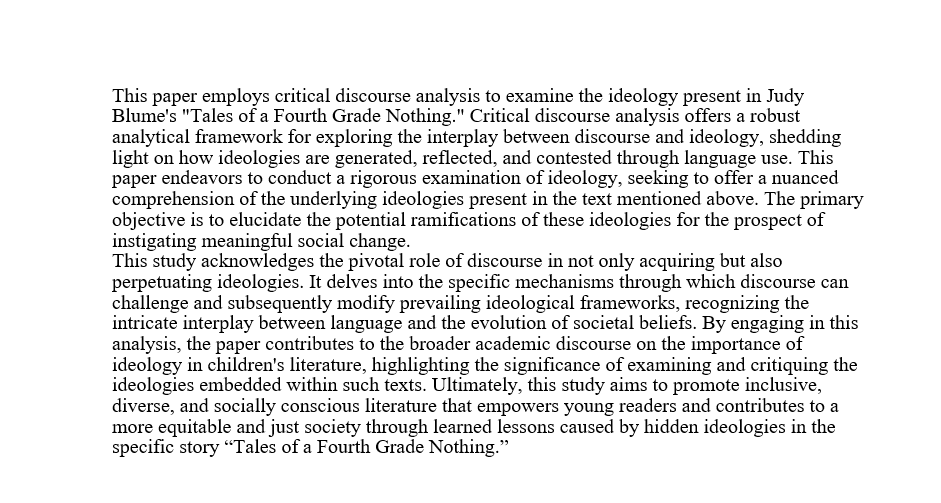Critical Discourse Analysis of Ideology in Judy Blume’s “Tales of a Fourth Grade Nothing”
DOI:
https://doi.org/10.21271/zjhs.28.2.20Keywords:
Discourse analysis, critical discourse analysis, ideology, children’s literature.Abstract
This paper employs critical discourse analysis to examine the ideology present in Judy Blume's "Tales of a Fourth Grade Nothing." Critical discourse analysis offers a robust analytical framework for exploring the interplay between discourse and ideology, shedding light on how ideologies are generated, reflected, and contested through language use. This paper endeavors to conduct a rigorous examination of ideology, seeking to offer a nuanced comprehension of the underlying ideologies present in the text mentioned above. The primary objective is to elucidate the potential ramifications of these ideologies for the prospect of instigating meaningful social change.
This study acknowledges the pivotal role of discourse in not only acquiring but also perpetuating ideologies. It delves into the specific mechanisms through which discourse can challenge and subsequently modify prevailing ideological frameworks, recognizing the intricate interplay between language and the evolution of societal beliefs. By engaging in this analysis, the paper contributes to the broader academic discourse on the importance of ideology in children's literature, highlighting the significance of examining and critiquing the ideologies embedded within such texts. Ultimately, this study aims to promote inclusive, diverse, and socially conscious literature that empowers young readers and contributes to a more equitable and just society through learned lessons caused by hidden ideologies in the specific story “Tales of a Fourth Grade Nothing.”
References
- Bandura, A., 1969. Social-learning theory of identificatory processes. Handbook of socialization theory and research, 213, p.262. available at: https://n9.cl/kwvyv [Accessed: 5 August 2023].
- Blommaert, J. and Bulcaen, C., 2000. Critical discourse analysis. Annual review of Anthropology, 29(1), pp.447-466. Available at: https://shorturl.at/qrxZ6 [Accessed: 6 July 2023].
- Brown, G. and Yule, G., 1983. Discourse analysis. Cambridge University Press.
- Fairclough, N., 2013. Critical discourse analysis. In The Routledge handbook of discourse analysis (pp. 9-20). Routledge. Available at: http://tiny.cc/4hj9vz [Accessed: 3 August 2023].
- Geerts, S. and Van den Bossche, S., 2014. Never-ending stories: adaptation, canonisation and ideology in children's literature. Academia Press. Available at: file:///Users/besttech/Downloads/Never_ending_Stories_Adaptation_Canonisa.pdf [Accessed: 7 July 2023].
- Gumperz, J.J. ed., 1982. Language and social identity. Cambridge University Press.
- Hjelm, T., 2021. Discourse analysis. The Routledge handbook of Research Methods in the study of religion, pp. 229-244. Available at: https://helda.helsinki.fi/server/api/core/bitstreams/92f27eb2-2e8e-4c6f-b67f-74430b0cc761/content [Accessed: 6 July 2023].
- Hodge, B., 2012. Ideology, Identity, Interaction: Contradictions and Challenges for Critical Discourse Analysis. Critical Approaches to Discourse Analysis across Disciplines, 5(2). Available at: https://www.lancaster.ac.uk/fass/journals/cadaad/wp-content/uploads/2015/01/Volume-5_Hodge.pdf [Accessed: 2 July 2023].
- Hunt, P., 2003. Literature for children. Routledge. Available at: https://shorturl.at/fnY34 [Accessed: 8 August 2023].
- Hyland, K., 2018. Metadiscourse: Exploring interaction in writing. Bloomsbury Publishing.
- Lazar, M. ed., 2005. Feminist critical discourse analysis: Gender, power and ideology in discourse. Springer. pp. 2-6. Available at: http://tiny.cc/bgj9vz Accessed: 3 July 2023].
- Lehtonen, S., 2007. Feminist critical discourse analysis and children’s fantasy fiction–modeling a new approach. Past, present, future–From women’s studies to post-gender research, pp.14-17. Available at: https://n9.cl/80tut [Accessed: 22 July 2023].
- Leland, C.H., Lewison, M. and Harste, J.C., 2017. Teaching children's literature: it's critical!. Routledge. Available at: https://shorturl.at/fsEJ5 [Accessed: 3 July 2023].
- Martens, A., 2015. Ideology in children’s Literature: critical discourse analysis of the adult-child power relation in Roald Dahl’S Matilda. University of Amsterdam, pp. 4-46. Available at: https://n9.cl/nx3q6 [Accessed: 4 July 2023].
- McCallum, R. and Stephens, J., 2011. Ideology and children’s books. Handbook of research on children’s and young adult literature, (2001), pp. 359-373. Available at: https://shorturl.at/cCFKT [Accessed: 4 July 2023].
- McCallum, R., 2012. Ideologies of identity in adolescent fiction: The dialogic construction of subjectivity. Routledge. Available at: https://shorturl.at/ghKLX [Accessed: 7 July 2023].
- Potter, J. and Edwards, D., 1990. Nigel Lawson's tent: Discourse analysis, attribution theory and the social psychology of fact. European journal of Social Psychology, 20(5), pp.405-424. Available at: http://tiny.cc/sgj9vz [Accessed: 28 July 2023].
- Robin, A.L. and Foster, S.L., 2002. Negotiating parent-adolescent conflict: A behavioral-family systems approach. Guilford Press. pp. 7-30. Available at: http://tiny.cc/8gj9vz [Accessed: 25 July 2023].
- Rogers, R., 2004. Setting an agenda for critical discourse analysis in education. An introduction to critical discourse analysis in education, pp.237-254. Available at: https://n9.cl/u6t32 [Accessed: 5 July 2023].
- Sarland, C., 1999. The impossibility of innocence: Ideology, politics, and children’s literature. Understanding children’s literature, pp.39-55. Available at: https://shorturl.at/mnqI9 [Accessed: 8 July 2023].
- Stemler, S., 2000. An overview of content analysis. Practical assessment, research, and evaluation, 7(1), p.17. Available at: https://scholarworks.umass.edu/cgi/viewcontent.cgi?article=1100&context=pare [Accessed: 20 July 2023].
- Tenorio, E.H., 2011. Critical discourse analysis, an overview. Nordic journal of English studies, 10(1), pp.183-210. Available at: file:///Users/besttech/Downloads/658-2391-1-PB%20(3).pdf [Accessed: 2 July 2023].
- Van Dijk, T.A., 2015. Critical discourse analysis. The handbook of Discourse Analysis, pp.466-485. Available at: http://www.sscnet.ucla.edu/anthro/faculty/ochs/articles/Ochs_2015_Discursive_Underpinnings.pdf#page=496 [Accessed: 2 July 2023].
- Weiss, G. and Wodak, R. eds., 2007. Critical discourse analysis. New York: Palgrave Macmillan, pp. 167-199.
- Wohlwill, J.F., 2013. The study of behavioral development. Academic Press, pp. 3-17. Available at: https://n9.cl/v3du2 [Accessed: 9 August 2023].

Downloads
Published
Issue
Section
License
Copyright (c) 2024 Binin Mustafa Saeed

This work is licensed under a Creative Commons Attribution 4.0 International License.









